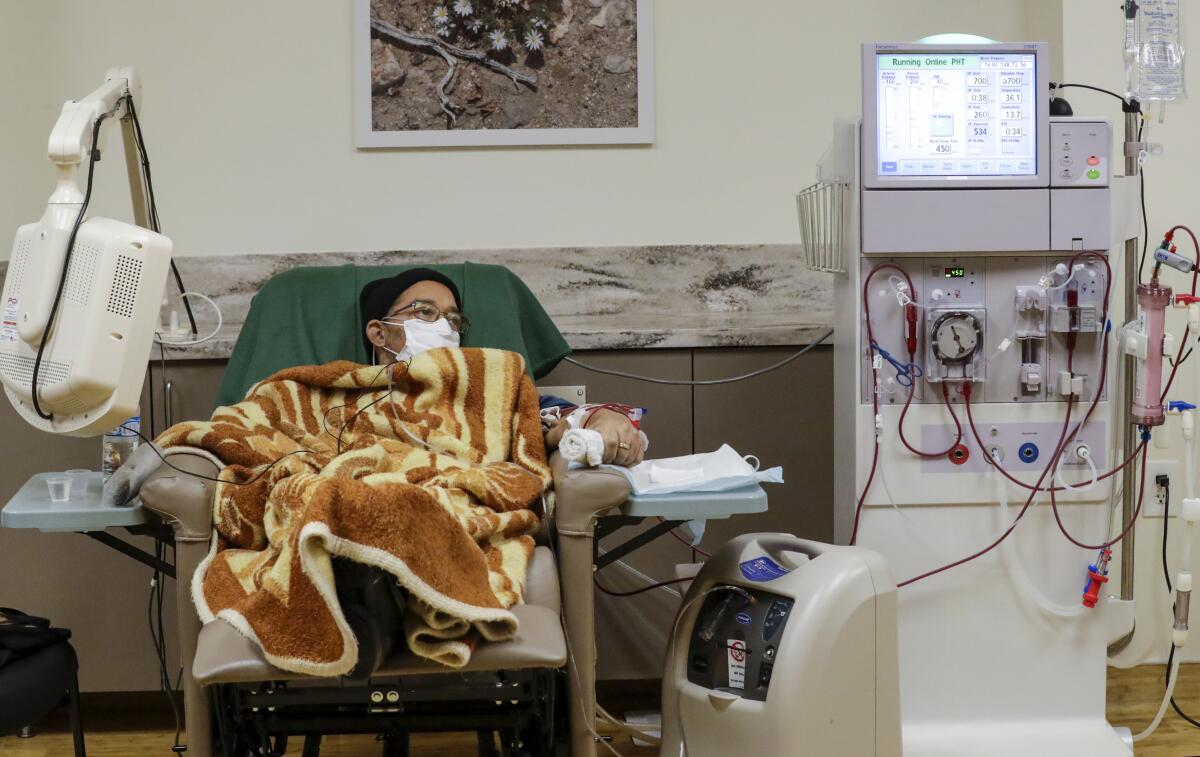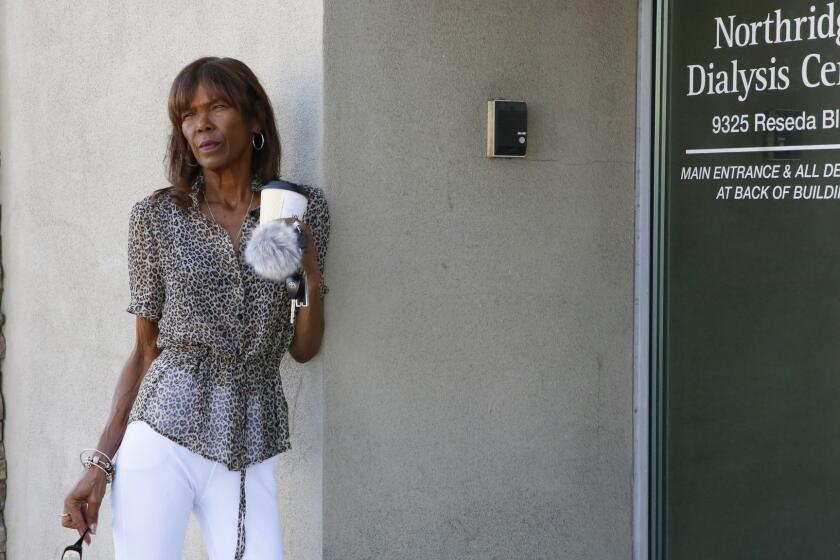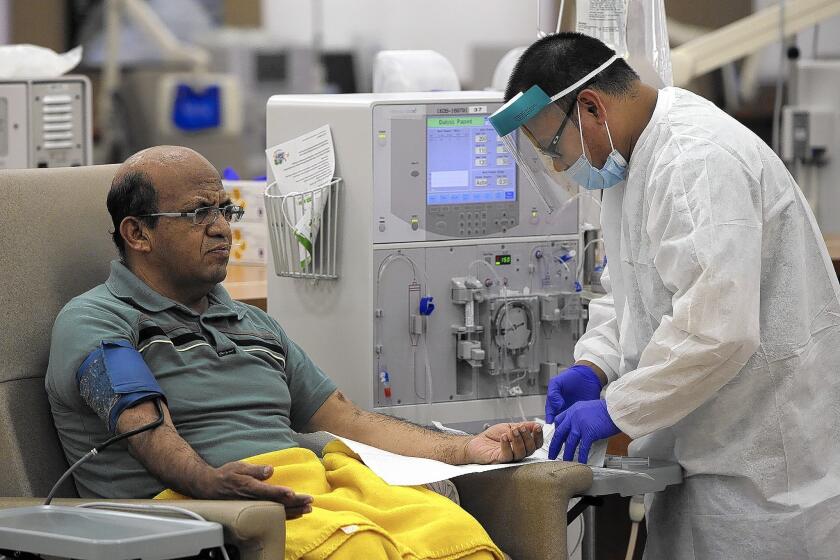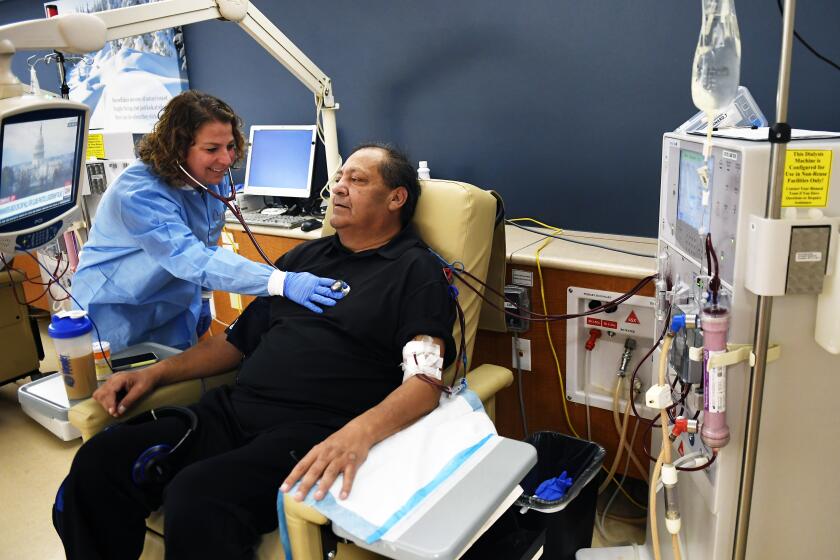Column: Obscenely rich dialysis firms are spending millions to defeat Proposition 29’s tighter regulations

- Share via
A good rule of thumb for assessing the value of a business is to look at how much its owners will spend to defend it from regulations. By that measure, the dialysis business is very valuable indeed.
We can determine that from the money the two leading companies in the field are spending to defeat Proposition 29 in next month’s election.
The companies are Denver-based DaVita and the German firm Fresenius Medical Care, which together own about 75% of the 650 licensed dialysis clinics in California.
The medical evidence has been completely overwhelmed by the drive for profits.
— Samuel Dickman, healthcare researcher
They have contributed about $80 million of the $86 million raised thus far to oppose Proposition 29; a third, much smaller firm, U.S. Renal Care, contributed almost all the rest.
That’s on top of the $96.6 million the top two firms spent to defeat Proposition 23 in 2020 and the $102.6 million they spent to defeat Proposition 8 in 2018.
Get the latest from Michael Hiltzik
Commentary on economics and more from a Pulitzer Prize winner.
You may occasionally receive promotional content from the Los Angeles Times.
Those measures were very similar to Proposition 29; all three were placed on the ballot by the Service Employees International Union, which has been trying to unionize dialysis workers. In each of those years, DaVita and Fresenius accounted for about 92% of the spending to oppose the measures.
Proposition 29 would require every dialysis clinic to have at least one healthcare professional — doctor, nurse practitioner or physician assistant — on-site during treatment hours. It would require clinics to report infection-related data to state authorities, to disclose their owners and to obtain consent from the state Department of Public Health before shutting down or reducing services. Violations could cost up to $100,000 each.
The underlying concern addressed by Proposition 29 (and its earlier iterations) is that treatment at for-profit clinics such as those owned or operated by DaVita and Fresenius is being compromised by the profit motive.
The worst maladies of the American healthcare system are related to corporate profits: The competition among insurance companies to avoid the sickest customers and extract the most money from the rest, and the rise of for-profit healthcare providers.
Studies have documented that for-profit clinics generally have had lower staffing levels than not-for-profit facilities, lower rates of referrals for kidney transplants — the option with the best outcomes for patients — and higher usage of drugs that bring higher profits but also carry higher stroke and death rates.
“If we were paying attention to the evidence, there would be major policy changes to address what is a life-or-death situation for thousands of patients each year,” says Samuel Dickman, a co-author of a 2020 survey that showed that patients at for-profit dialysis clinics had a 7% higher mortality rate per year than those at nonprofit facilities.
The discrepancy means that 3,800 deaths might be averted annually if for-profit mortality rates matched those of nonprofit facilities, the survey calculated.
“The medical evidence has been completely overwhelmed by the drive for profits,” Dickman says.
The dominance of DaVita and Fresenius in this field can’t be overstated. Their more than 5,300 outpatient clinics are estimated to account for about 60% of all U.S. facilities. They are estimated to serve 85% of all patients with end-stage kidney disease and collect 90% of the industry’s profits.
The No on 29 campaign, to which DaVita and Fresenius referred my requests for comment, says the staffing mandate is unnecessary and so costly that hundreds of clinics would be forced to close if it passes. (That’s according to a study the dialysis companies commissioned from Berkeley Research Group, a research-for-hire firm.)
Given the implication in the campaign’s TV commercials that so many dialysis clinics function on the knife-edge of insolvency that the initiative would deprive thousands of kidney disease patients of access to this lifesaving procedure, you might wonder how the companies can afford the No on 29 campaign. Easy: It costs a tiny fraction of their profits.
Things were looking bad for the Affordable Care Act in 2016 and 2017.
DaVita earned $1.8 billion in operating profits on $11.6 billion in revenue last year, for a healthy profit margin of about 15%, about the same margin it made in each of the two previous years.
Fresenius earned about $1.66 billion on North American revenue of $12.2 billion last year, for a margin of 13.6%; the previous year its profits came to about 17% of sales in North America.
DaVita has another deep pocket it might be able to pick in a pinch: Billionaire Warren Buffett owns 38% of the company through his Berkshire Hathaway conglomerate, according to DaVita’s most recent proxy statement.
The DaVita-Fresenius duopoly in outpatient dialysis has raised concerns among healthcare experts for years. Before examining how it affects patient health, let’s look at how it came about.
As I’ve reported before, short of a kidney transplant, dialysis is the only life-preserving option for people with end-stage renal disease. That’s a condition in which the kidneys have shut down, often because of diabetes or chronic high blood pressure. Patients must undergo dialysis, in which their blood is circulated through a filter to remove waste products, several times a week for hours each time.
Dialysis is so expensive — it can cost as much as $150,000 annually per patient — that in the days before the Affordable Care Act, patients couldn’t get insurance. As a result, Congress in 1973 allowed renal patients to enroll in Medicare at any age. That effectively made end-stage renal disease the only condition in America subject to a single-payer program. (Some are also covered by Medicaid.)
Combined with the rapid increase in diabetes, hypertension and other underlying conditions, the federal program turned dialysis into a hugely profitable business. About 10,000 patients were covered in 1973; today, more than 470,000 are. Federal spending has soared to about $51 billion a year in 2019 from $1.1 billion (in current dollars) in 1973.
DaVita and Fresenius have been big beneficiaries of these trends. The Affordable Care Act was a major boon for the companies because it prohibited private insurers in the individual market from rejecting dialysis patients.
Medicare pays about $250 per patient treatment; at three treatments per week, that might yield about $39,000 a year for a Medicare enrollee. But private insurers have been charged $1,000 to $2,000 per treatment, or $156,000 to $312,000 a year.
A front group for big dialysis firms threatens to pull out of California if Newsom signs a bill limiting their profits.
Allegations soon surfaced from insurance companies and shareholders that the dialysis firms were “steering” patients away from Medicare and persuading them to sign up for private health plans instead. (The firms deny this.) DaVita settled a shareholder lawsuit over the alleged scheme for $135 million in 2020 without admitting guilt.
Suspicions focused on the American Kidney Fund, which describes itself as, among other things, a charity helping kidney patients pay premiums for private insurance coverage and other treatment-related costs. Judging from its financial disclosures, however, the fund resembles an arm of DaVita and Fresenius, which have contributed well more than 80% of its annual revenues in recent years.
Lawmakers and healthcare experts have found that relationship disturbing, because the fund’s premium assistance has arguably made it easier for patients to give up their Medicare coverage and enroll with private health plans.
The money trail is intriguing, to say the least: DaVita and Fresenius are the principal financial backers of a charity that helps patients sign up for insurance that puts more money in the firms’ pockets. The fund says it does not steer patients to any particular insurance coverage.
The steering allegations are troubling because private insurance plans are the wrong choice for many patients, in part because the American Kidney Fund cuts off premium grants to patients soon after they receive a kidney transplant. That can leave patients unable to afford health insurance, a critical issue for transplant patients.
The Sutter Health and dialysis monopolies show why America can’t get healthcare costs under control.
“Horrifically, this impacts the country’s most underserved patients the most, further contributing to the kidney transplant disparity that already exists in this country and is a public health crisis,” social worker Teri Browne, a former DaVita and Fresenius employee, told the Centers for Medicare and Medicaid Services at a hearing in 2016.
The issue led to a separate regulatory effort in California. This was AB 290, a law signed by Gov. Gavin Newsom in 2019. The measure barred dialysis clinics from steering patients toward any particular coverage type and capped reimbursement at the Medicare rate for any patients receiving third-party financial assistance, such as that provided by the American Kidney Fund.
The fund tried to strong-arm Newsom into vetoing the bill by telling its grantees that it would be pulling out of the state if he signed it; he wasn’t swayed. After he signed, the fund and others sued. A federal judge blocked the law in December 2019. The case is still pending.
That brings us to the question of the quality of treatments provided by the for-profit dialysis industry.
A 2019 study attributed the lower rates of access to transplantation among patients at for-profit clinics to factors such as less time that nephrologists at those clinics spend with patients and less counseling about transplantation — even though federal regulations require all dialysis facilities to “provide transplant education and help interested patients pursue kidney transplantation,” the study said.
Another study by researchers at Brigham Young and Duke universities that tracked the acquisitions of 1,200 independent clinics by large chains over a 12-year period ending in 2010 found a sharp increase in the use of erythropoetin, an anti-anemia drug that carries a high Medicare reimbursement rate but higher health hazards, after clinics were acquired.
The large-chain acquirers also replaced high-skilled nurses with lower-skilled technicians, the study found. Patient loads per employee increased by 11.7% and the number of patients treated at each station increased by 4.5%, “stretching resources and potentially reducing the quality of care,” the paper reported.
Patients at acquired clinics were 4.2% more likely to be hospitalized in any given month and “8.5% less likely to receive a kidney transplant or to be added to a transplant waiting list during their first year on dialysis.”
DaVita and Fresenius want you to think that Proposition 29 is nothing but an attempt by the SEIU to “extort” the firms into agreeing to unionization. That’s a smokescreen that obscures questions involving the quality of care for kidney patients caught up in the firms’ unimpeded march to domination of this highly profitable treatment field.
Medical studies suggest that having more and better-trained staff, including unionized staff, produces better patient outcomes at facilities such as nursing homes. Is there any reason to think the same wouldn’t be true at dialysis clinics?
As DaVita and Fresenius grow even more dominant, they’ll have ever more power to dictate the level of care their patients receive. The profit motive will become only stronger, and the only force standing in its way will be voters, at the ballot box.
More to Read
Inside the business of entertainment
The Wide Shot brings you news, analysis and insights on everything from streaming wars to production — and what it all means for the future.
You may occasionally receive promotional content from the Los Angeles Times.














